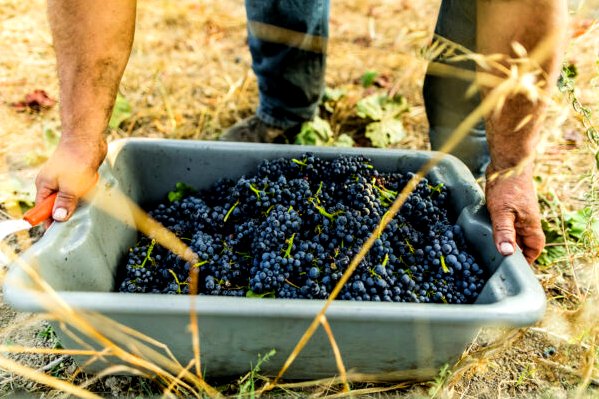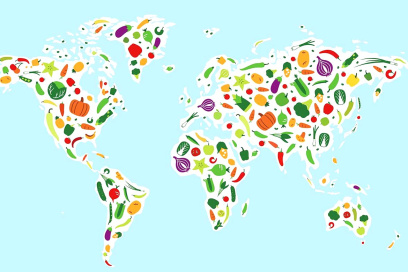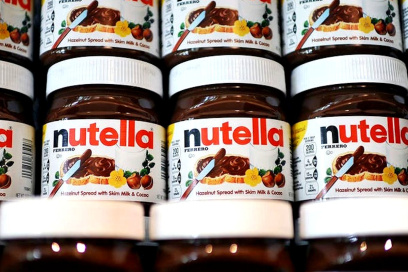Veganism - an approach to living that forgoes any animal-derived products in food, clothing and all aspects of life - has gained increasing attention as an ethical lifestyle choice. But its complexity goes well beyond simple abstention from animal products - just one aspect of being vegan that cannot be measured easily by solely abstaining from animal-derived foods alone. Veganism encompasses anything that contains animal products - even, and possibly unexpectedly, wine! But does everyone realize this fact?
Many people enjoy indulging in an exquisite glass of wine while partaking in their favorite social activity, but are unaware that not all wines are created equally; an alarming percentage are non-vegan and must be avoided. Wine production utilizes various animal-derived substances such as egg whites, isinglass and gelatin that come from animals as part of its intricate production process. While these potentially unpleasant-sounding ingredients aid in wine clarification and fermentation processes, it should be remembered that none are vegan-friendly. Therefore, vegan lifestyle enthusiasts may find themselves at an impasse between drinking wine or adhering to veganism.
In this article, we'll look closely at this question of "Is wine vegan?" in its entirety. We will explore a detailed discussion on vegan wine options, animal-derived wine additives and any other aspects related to veganism and wine. Regardless of your level of expertise in veganism or your journey to exploring this vibrant way of living, you're guaranteed to gain some invaluable insights into this complex subject matter.
I. VEGAN WINES: A NEW CRUSH?
Wine has long been used as a means to relax and elevate the dining experience; yet for vegans, the concept of sipping on some sort of alcohol may raise eyebrows; what many are unaware of is that not all wines can be considered vegan-friendly.
What is vegan wine?
Simply put, vegan wine refers to any variety produced without using ingredients derived from animals for fermentation purposes. Vegan wines typically use natural, organic or alternative components instead. Their distinctive characteristics lie both in their finished product as well as during production: clarification methods like Bentonite clay can prove particularly effective at binding to residual proteins present in wine thus producing an ideal final product. These production techniques vary depending on each winemaker.
Fining agents
Pea protein, an excellent vegan fining agent, binds with tannins present in wine to cause them to aggregate together into long strands that settle at the bottom of the tank - potentially making it an attractive vegan solution. As an alternative, potato protein provides similar properties. Activated charcoal provides an alternative to animal-derived fining agents, filtering wine through a bed of activated charcoal to absorb impurities resulting in crystal clear finished product. There are various vegan wine production methods which may differ considerably and yield differing results; one method may bring surprising outcomes!
Labeling and considerations
Wineries have begun labeling their wines as vegan to appeal to the growing vegan customer base, yet it is important to remember that veganism differs from healthy lifestyles that limit sugar and chemicals such as those associated with organic wines; vegan wines still may contain high levels of both sugar and chemicals - so reading labels carefully before purchasing.
Additionally, it should be noted that certain wines may feature vegan fining agents but may not be 100% vegan throughout their production process; winemakers may still employ animal-derived fertilizers or pesticides; thus requiring a comprehensive analysis of both natural and organic production methods before reaching any final conclusions.
Conclusion
To sum it all up, vegan wine can help ease ethical conflicts for those committed to vegan lifestyle or ethos. As demand from growing health-conscious consumer base has resulted in extensive research for this niche market of wine, vegan varieties have become more readily available and you can unwind and clink your glasses while feeling at peace without compromising ethical beliefs.
Click here for more on Vegan Wines at crushmag-online.com.II. WINE AND ANIMAL-DERIVED ADDITIVES
Producing wine is a complex process, which may involve using animal-derived additives to assist with clarification and fermentation processes, as detailed in the introduction. Hereinbelow we shall identify some of the more prevalent animal-based components found during wine production.
Gelatin
An animal-derived protein isolate extracted from bones, connective tissues, and skin of animals, tops the list.
Egg whites
Egg whites serve as an invaluable clarifying agent that improves texture and overall quality during winemaking production.
Isinglass
Made from fish bladders provides another powerful means of wine clarity.
Casein and Chitin
Casein found in milk can occasionally find use as part of winemaking production process as does chitin made from crustacean shells; all three agents work to help in clarifying wine.
Though animal-derived additives may be effective, their use raises ethical and environmental concerns for vegans and the planet as a whole. Animal products used in wine production often contribute to factory farming cruelty, overfishing and environmental degradation; so finding vegan-friendly alternatives that can replace such ingredients should be of utmost importance.
Alternative fining agents do exist that can achieve similar effects as animal-derived ingredients, including natural methods like gravity setting or sedimentation that can replace additives in production processes. Some winemakers have even taken it further by producing 100% organic wines made with unfiltered grapes, offering consumers more natural and animal cruelty-free wines.
Conclusion: Winemaking with animal-derived additives remains an issue that affects vegans worldwide, yet owing to alternative solutions and an increased awareness of ethical considerations regarding these derivatives, many wineries are taking steps to limit or avoid using such ingredients altogether. As consumers looking to lead vegan lifestyles it's vital that we check labels and inquire about production processes prior to purchasing any wine products.
III. NAVIGATING THE WINE LIST AS A VEGAN
Finding vegan-friendly wines when dining out can be an unnerving task for vegans. Even though some restaurants provide information regarding grape varietals and winemakers, little detail exists regarding production techniques or animal-derived additives used during winemaking. There is hope, though: an increase in vegan food culture has resulted in merchants labeling which wines are suitable options and validating vegan dietary preferences.
Labeling Strategies
Restaurants' new labeling strategies have made it much simpler for vegans to evaluate wine options when dining out, particularly at restaurants with unclassified wines. If this occurs, simply ask your sommelier or server their opinion as to its vegan-friendliness; their extensive knowledge about both winemaking and veganism may prove invaluable! Alternatively, extensive research by vegans may lead to producers listing vegan-friendly production processes on their websites.
Natural or Organic Wine Shops
Finding stores specializing in natural or organic wines may also prove useful, since these merchants provide in-depth descriptions of their wines, including production processes. This helps vegans make informed decisions.
Navigating the wine market has traditionally been daunting for vegans. But with increased self-awareness and labeling, a way out has been found: engage servers when needed or explore authentic natural wine shops to reduce anxiety when making decisions. When in doubt conduct research to get clarity.
Find vegan-friendly wines on maivino.com.IV. CHOOSING VEGAN-FRIENDLY WINES
Wine selection may seem like a complex and laborious task to many, yet finding vegan-friendly wines has become much simpler in recent years. There is now a plethora of choices available specifically tailored for vegans that has materialised into reality.
Recognizing Vegan-Friendly Wines
One way of recognizing vegan-friendly wines is to read labels. Wine makers now indicate this characteristic on their labels explicitly to appeal to a growing vegan demographic, making the search process stress-free for vegans searching for wine that meets their ethical beliefs. Wine stores have even started labelling all their wines as being suitable for vegans as another step toward simplifying this selection process.
Even if a wine doesn't carry an explicit vegan-friendly label, that doesn't spell doom for vegan wine enthusiasts. One strategy would be to conduct research on its maker and production techniques - those using vegan-friendly production practices tend to take pride in doing so and may advertise them as vegan wines so as to cater specifically to this niche market.
Choosing Vegan-Friendly Wines
When choosing vegan-friendly wines, it is also essential to take note of whether the wine is natural or organic. Wine produced using methods in line with vegan beliefs tend to be preferred over those produced using less eco-friendly processes - which should make selecting vegan-friendly wines easier! Furthermore, production techniques often appeal more directly to wine consumers with environmentally conscious sensibilities.
Visit Vegan Wineries and Vineyards
Visit a vegan winery or vineyard for an unforgettable vegan wine experience, producing exclusively plant-based wines with tours and tasting sessions for visitors. These establishments specialize in producing vegan wines exclusively, providing tours and tasting sessions.
Vegans can now enjoy their favorite glass of wine without compromising their beliefs. Wine producers now mention vegan-friendliness of their wines on labels, and many organic or natural wines use vegan-friendly techniques in production. Furthermore, research can be conducted or vegan wineries and vineyards visited to experience optimal vegan wine experiences.
Conclusion
Examining the ethical and health implications of wine consumption by vegan adherents, we find that questions surrounding animal-derived additives used in wine production remain of grave concern. Due to a lack of transparency regarding labeling of such additives, vegan consumers face ethical qualms regarding their beverage selections.
As veganism has grown increasingly popular, its prevalence has spurred on an explosion in vegan-friendly wine production utilizing natural and organic fining agents and production methods that do not contain animal derivatives, further diversifying market diversity while opening it up to plant-based enthusiasts without compromise to moral convictions. This advances opened up new wine sipping possibilities without compromise to moral convictions.
Vegan adherents need to exercise caution when selecting wine options available, analyzing their ingredients and researching manufacturing processes to ensure compliance with ethical standards. With an increase in awareness about vegan culture comes greater labeling, making it easier to select vegan-friendly wines when dining out.
Integrating wine into a vegan lifestyle is, ultimately, a personal decision influenced by individual beliefs and values. To make an informed decision requires gathering sufficient knowledge about various wines that align with one's moral and ethical convictions. As demand for vegan-friendly wines continues to increase, industry standards have evolved more inclusively; accommodating for ethical beliefs while creating convivial settings. Therefore, whether celebrating an important milestone or unwinding after a hard day at work a glass of vegan wine is a toast towards an equitable and more inclusive future - cheers!





